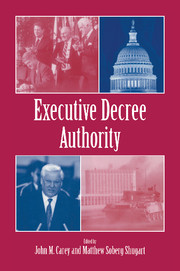Book contents
- Frontmatter
- Contents
- List of Contributors
- Preface
- 1 Calling Out the Tanks or Filling Out the Forms?
- Part I From Delegated to Constitutional Decree Authority
- 2 When the President Governs Alone: The Decretazo in Argentina, 1989–93
- 3 Presidential Decree Authority in Russia, 1991–95
- 4 Presidential Usurpation or Congressional Preference? The Evolution of Executive Decree Authority in Peru
- 5 Presidential Decree Authority in Venezuela
- Part II Constitutional Decree Authority and Conflict Between the Branches
- Part III Absence of Conflict Over Decree
- Appendix of Constitutional Provisions Regarding Decree
- References
- Index
5 - Presidential Decree Authority in Venezuela
Published online by Cambridge University Press: 18 December 2009
- Frontmatter
- Contents
- List of Contributors
- Preface
- 1 Calling Out the Tanks or Filling Out the Forms?
- Part I From Delegated to Constitutional Decree Authority
- 2 When the President Governs Alone: The Decretazo in Argentina, 1989–93
- 3 Presidential Decree Authority in Russia, 1991–95
- 4 Presidential Usurpation or Congressional Preference? The Evolution of Executive Decree Authority in Peru
- 5 Presidential Decree Authority in Venezuela
- Part II Constitutional Decree Authority and Conflict Between the Branches
- Part III Absence of Conflict Over Decree
- Appendix of Constitutional Provisions Regarding Decree
- References
- Index
Summary
EXECUTIVE–LEGISLATIVE RELATIONS
Democratic rule has now lasted nearly forty years in Venezuela, although the system has recently been shaken by a mismanaged neoliberal, austerity package; public riots and military overreaction; two attempted coups; and presidential impeachment proceedings. It is the oldest extant democracy in South America, and as such, it has the longest historical record of currently existing regimes. Brewer-Carías' description of the Venezuelan system, through its own ambiguity, may best capture its mixed nature: el sistema presidential con sujetión parlamentaria, or “a presidential system subject to the parliament” (1985b: 153–190; 1985a: 131). The ambiguity of this phrase accurately reflects the complexity surrounding the president's use of the office's constitutionally allocated powers. In comparative terms the formal powers of Venezuelan presidents are quite minimal, yet it is widely perceived that the president dominates the political arena. An empirical analysis of presidential decree authority helps sort out this apparent contradiction.
In Venezuela the president's formal powers are comparatively few, but a number of factors, in a sense, can magnify their importance. Venezuelan presidents use their nonlegislative decree powers to great effect. They draw attention to and study particular issues, draft legislation, appoint government functionaries, regulate the economy – and they determine the limits of constitutional guarantees. However, they never receive binding legislative powers unless the Congress delegates it to them. So, presidents are always operating within bounds set for them by the legislative branch. Therefore, to understand presidential decree authority, we will have to account for electoral regulations, internal party rules, and the partisan composition of both branches.
- Type
- Chapter
- Information
- Executive Decree Authority , pp. 142 - 172Publisher: Cambridge University PressPrint publication year: 1998
- 6
- Cited by

